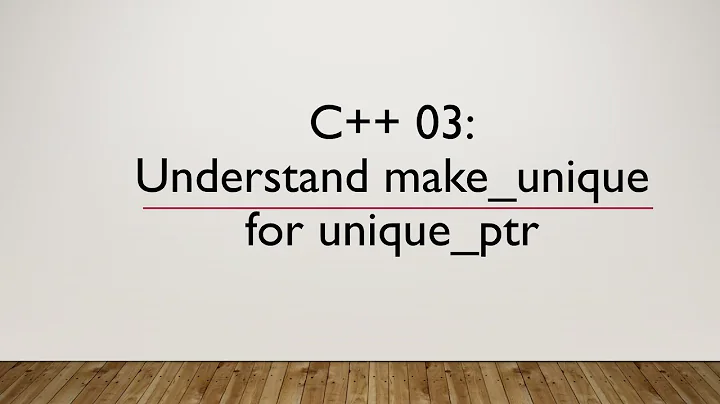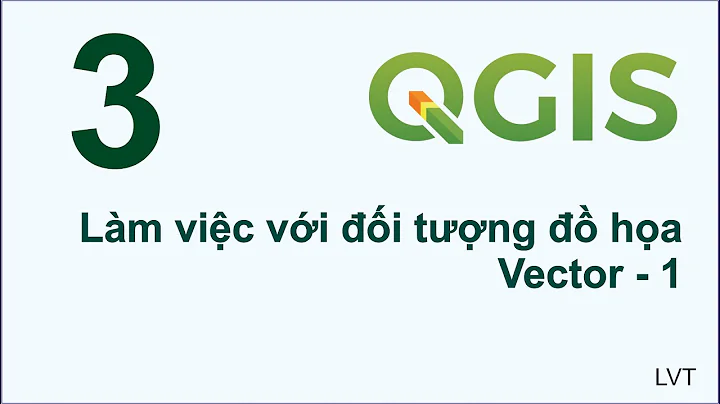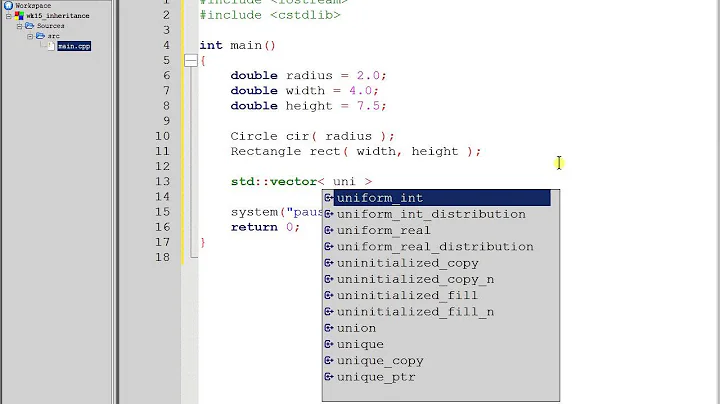vector of unique_ptr in C++11
Solution 1
I would suggest that instead of maintaining and returning an un-unique_ptred vector, you provide functions to access the elements directly. This encapsulates the storage of your resources; clients don't know that they are stored as unique_ptrs, nor that they are kept in a vector.
One possibility for this is to use boost::indirect_iterator to dereference your unique_ptr automatically:
using ResourceIterator =
boost::indirect_iterator<std::vector<std::unique_ptr<HeavyResource>>::iterator,
const HeavyResource>;
ResourceIterator begin() { return std::begin(_vectorOfHeavyResources); }
ResourceIterator end() { return std::end(_vectorOfHeavyResources); }
Solution 2
If you encounter this often, it might make sense to write a class, that behaves like a unique_ptr, but passes the constness of the pointer to the object it points to. That way, you can just return a const reference to your vector.
I ended up writing this once and be done with it:
#include <iostream>
#include <vector>
#include <memory>
//unique,const-preserving pointer
template<class T>
class ucp_ptr {
std::unique_ptr<T> ptr;
public:
ucp_ptr() = default;
ucp_ptr(T* ptr) :ptr{ ptr }{};
ucp_ptr(std::unique_ptr<T>&& other) :ptr(std::move(other)){};
T& operator*() { return ptr.get(); }
T const & operator*()const { return ptr.get(); }
T* operator->() { return ptr.get(); }
T const * operator->()const { return ptr.get(); }
};
struct Foo {
int a = 0;
};
int main() {
std::vector<ucp_ptr<Foo>> v;
v.emplace_back(new Foo());
v.emplace_back(std::make_unique<Foo>());
v[0]->a = 1;
v[1]->a = 2;
const std::vector<ucp_ptr<Foo>>& cv = v;
std::cout << cv[0]->a << std::endl; //<-read access OK
//cv[1]->a = 10; //<-compiler error
}
Of course, you can extend it a bit, if you need custom deleters or want to add a specialization for managing arrays, but this is the base version. I also belive I've seen a more refined version of this somwhere here on SO, but I can't find it right now.
Here is an example, of how this can be used in a class:
class Bar {
std::vector<ucp_ptr<Foo>> v;
public:
void add(const Foo& foo){
v.push_back(std::make_unique<Foo>(foo));
}
//modifying elements
void doubleElements() {
for (auto& e : v){
e->a *= 2;
}
}
const std::vector<ucp_ptr<Foo>>& showElements() const{
return v;
}
};
EDIT
As far as your update is concerened, you have to live with the fact that vector<T> is unrelated to vector<B> even if it would be valid to cast T to B and vice versa.
You can write adaptors, that give you a different view to the elements (by casting each element when necessary) but - aside from creating a new vector of the proper type - there exists no general meachanism (that I am aware of) to do what you want.
Related videos on Youtube
Witek
Updated on September 16, 2022Comments
-
Witek over 1 year
I recently switched to C++11 and I'm trying to get used to good practices there. What I end up dealing with very often is something like:
class Owner { private: vector<unique_ptr<HeavyResource>> _vectorOfHeavyResources; public: virtual const vector<const HeavyResource*>* GetVectorOfResources() const; };This requires me to do something like adding a _returnableVector and translating the source vectors to be able to return it later on:
_returnableVector = vector<HeavyResource*>; for (int i=0; i< _vectorOfHeavyResources.size(); i++) { _returnableVector.push_back(_vectorOfHeavyResources[i].get()); }Has anyone noticed similar problem? What are your thoughts and solutions? Am I getting the whole ownership idea right here?
UPDATE: Heres another thing: What if one class returns a result of some processing as
vector<unique_ptr<HeavyResource>>(it passes the ownership of the results to the caller), and it is supposed to be used for some subsequent processing:vector<unique_ptr<HeavyResource>> partialResult = _processor1.Process(); // translation auto result = _processor2.Process(translatedPartialResult); // the argument of process is vector<const HeavyResource*>-
eerorika almost 9 yearsNot related to the constness problem (assuming that's important to your question), but if you want to share the pointers, then perhaps you don't actually want
unique_ptr... -
Witek almost 9 yearsI dont want to share the OWNERSHIP, just allow to look into the resources.
-
-
Witek almost 9 yearsI would repate my comment from above just to encourage discussion about understanding of ownership: "I don't want to share the OWNERSHIP, just allow readonly access into the resources." In my understanding usage of shared_ptr as in makes the ownership distributed. IMO in proper architectures you can clearly point the ownership.
-
 Galik almost 9 yearsI agree that
Galik almost 9 yearsI agree thatstd::shared_ptrshould be avoided unless you can't control which object needs to delete the resources. -
Witek almost 9 yearsThis requires a class containing the GetVectorOfResources to be though of as a Collection. And it makes sense as I think about it. Heres another thing then: What if one class returns a result of some processing as
vector<unique_ptr<HeavyResource>>(it passes the ownership of the results to the caller), and it is supposed to be used for some subsequent processing: vector<unique_ptr<HeavyResource>> result1 = _processor1.Process(); // translation auto result2 = _processor2.Process(translatedResult); // the argument of process is vector<const HeavyResource*>` -
TartanLlama almost 9 yearsIn that case, you could make
decltype(_processor2)::Processtake a range instead and pass indirect iterators to it. -
Witek almost 9 yearsI guess it will fail if you try to copy the returned vector.
-
Witek almost 9 yearsIt didn't... so that's also something to look into (time to understand reinterpret_cast ;) )
-
TartanLlama almost 9 yearsThis is very dangerous, as it assumes that
std::unique_ptrjust holds a single pointer, which is not necessarily the case, especially if you have a stateful custom deleter. -
 Tas almost 9 yearsIt's entirely up to you; however, you were trying to use
Tas almost 9 yearsIt's entirely up to you; however, you were trying to useunique_ptrand noted that you were having difficulty, whereasshared_ptrdoes what you need it to do. I would definitely useshared_ptrif I had someResourceManagerand needed to temporarily lend out resources. As suggested, you could create helper access functions but that's tedious if callers are allowed to do multiple things with the object.shared_ptrdoes what you need: it shares access. -
Arne Vogel almost 9 yearsType punning between unrelated non-POD types is not allowed by the standard, so this program is ill-formed. And the only efficiency gain is probably saving some typing.
-
Witek almost 9 yearsThe problem with this one is that once emplaced inside the Owner, even he's not allowed to modify his resources. But it might be useful.
-
MikeMB almost 9 years@Witek: Maybe I'm missing your point, but why shouldn't he? Can you give an example of what is not possible with this scheme?
-
MikeMB almost 9 yearsThis doesn't actually address the question. The OP wants to return a collection of pointers to
const. Wether they are raw, unique or shared actually addresses a different issue and are only relevant for how exactly the methods have to be written. -
MikeMB almost 9 years@Witek: Sorry, there was a typo in my solution: the
operator*of course returns aT¬ aT* -
MikeMB almost 9 years@Arne Vogel: While I don't want to encourage any form of UB, it has a significant efficiency gain compared to the OPs solution, as one can now return a reference or pointer to the internal vector instead of creating new vector. But again, any reliance on UB is a catastrophy waiting to happen.
-
Witek almost 9 yearsYou are right - I misunderstood your code at first. I'm also quite surprised that const vector allows access to const elements!
-
Witek almost 9 yearsNow I can't understand why doesn't
unique_ptrswork like yourucp_ptrs?! Ifvectormaps its constness to its elements, why doesn'tunique_ptrmap its constness to its value? -
MikeMB almost 9 years@Witek: Essentially, because smart pointers are supposed to work like real pointers and there are a lot of instances, where you want a
T const*orT* const, but not aT const* const.



![Smart Pointer C++11 std::unique_ptr [Part-1-Introduction]](https://i.ytimg.com/vi/L0grtkX180U/hq720.jpg?sqp=-oaymwEcCNAFEJQDSFXyq4qpAw4IARUAAIhCGAFwAcABBg==&rs=AOn4CLBUigFaaBs6wQky29ikASRPbWggFQ)

![[Khóa học lập trình C++ Cơ bản] - Bài 52: Cơ bản về lớp Vector | HowKteam](https://i.ytimg.com/vi/R6KYxkvg-UQ/hq720.jpg?sqp=-oaymwEcCNAFEJQDSFXyq4qpAw4IARUAAIhCGAFwAcABBg==&rs=AOn4CLA5QqRnbT0GdQqEENcuiQ3PQZQIgQ)
![#13 [C++]. Hướng Dẫn Sử Dụng Thành Thạo Vector Trong C++ | Lớp Vector Và Iterator](https://i.ytimg.com/vi/053Tcz4omzk/hq720.jpg?sqp=-oaymwEcCNAFEJQDSFXyq4qpAw4IARUAAIhCGAFwAcABBg==&rs=AOn4CLDRs4FTLNZB7zqHbGApi2yTigdAGg)



